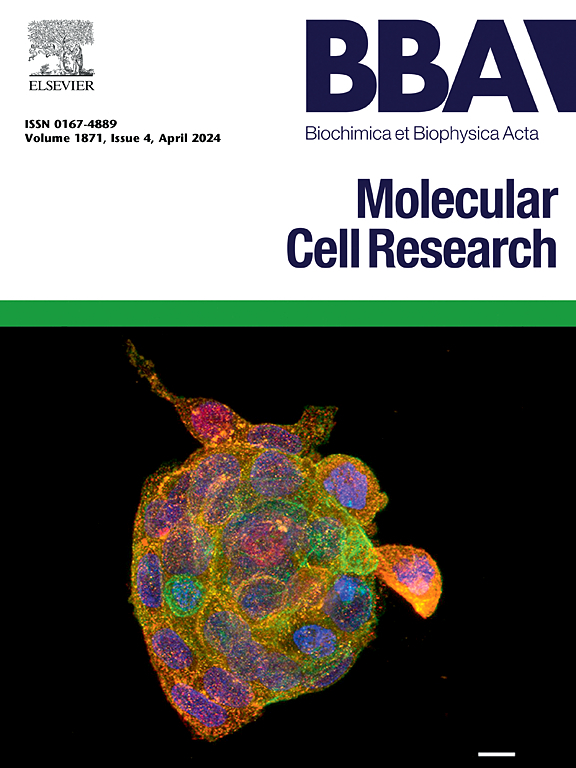GJB2通过上调TNC表达促进卵巢癌进展和顺铂耐药。
IF 3.7
2区 生物学
Q1 BIOCHEMISTRY & MOLECULAR BIOLOGY
Biochimica et biophysica acta. Molecular cell research
Pub Date : 2025-09-05
DOI:10.1016/j.bbamcr.2025.120058
引用次数: 0
摘要
顺铂耐药仍然是卵巢癌(OC)治疗的主要障碍。间隙连接蛋白β-2 (GJB2)是连接蛋白家族的关键成员,因其与遗传性耳聋有关而闻名。然而,它在卵巢癌化疗耐药中的作用仍未被探索。在本研究中,我们发现GJB2在预后不良的OC患者和顺铂耐药OC细胞中表达升高。GJB2敲低OVCAR-3细胞抑制肿瘤进展,通过增加药物摄入增强顺铂敏感性,而GJB2过表达促进肿瘤进展和顺铂耐药。此外,在临床组织样本中发现GJB2与TNC表达呈正相关。gjb2过表达细胞中TNC的下调消除了gjb2驱动的OC进展和顺铂耐药。最后,表儿茶素通过抑制GJB2表达增强药物摄取介导的顺铂敏感性。本研究表明GJB2是通过上调TNC表达克服OC顺铂耐药的潜在治疗靶点。表儿茶素可能通过靶向GJB2增强顺铂疗效。本文章由计算机程序翻译,如有差异,请以英文原文为准。

GJB2 promotes ovarian cancer progression and cisplatin resistance by upregulating TNC expression
Cisplatin resistance continues to be a major obstacle in the treatment of ovarian cancer (OC). Gap junction protein β-2 (GJB2), a key member of the connexin family, is well-known for its association with hereditary deafness. However, its role in ovarian cancer chemotherapy resistance remains unexplored. In this study, we found that increased expression of GJB2 was observed in OC patients with poor prognosis and in cisplatin-resistant OC cells. GJB2 knockdown in OVCAR-3 cells inhibited cancer progression and enhanced cisplatin sensitivity via increased drug uptake, while GJB2 overexpression promoted tumor progression and cisplatin resistance. Furthermore, a positive correlation between GJB2 and TNC expression was identified in clinical tissue samples. TNC knockdown in GJB2-overexpressing cells eliminated GJB2-driven OC progression and cisplatin resistance. Finally, epicatechin enhanced drug uptake mediated cisplatin sensitivity by inhibiting the GJB2 expression. This study demonstrates that GJB2 is a potential therapeutic target for overcoming cisplatin resistance in OC by upregulating TNC expression. Epicatechin may enhance cisplatin efficacy by targeting GJB2.
求助全文
通过发布文献求助,成功后即可免费获取论文全文。
去求助
来源期刊
CiteScore
10.00
自引率
2.00%
发文量
151
审稿时长
44 days
期刊介绍:
BBA Molecular Cell Research focuses on understanding the mechanisms of cellular processes at the molecular level. These include aspects of cellular signaling, signal transduction, cell cycle, apoptosis, intracellular trafficking, secretory and endocytic pathways, biogenesis of cell organelles, cytoskeletal structures, cellular interactions, cell/tissue differentiation and cellular enzymology. Also included are studies at the interface between Cell Biology and Biophysics which apply for example novel imaging methods for characterizing cellular processes.

 求助内容:
求助内容: 应助结果提醒方式:
应助结果提醒方式:


